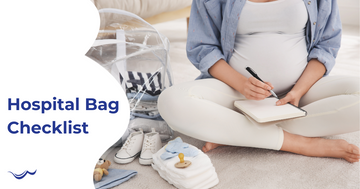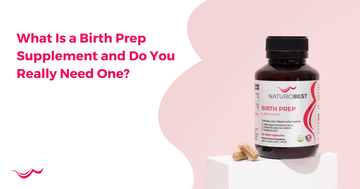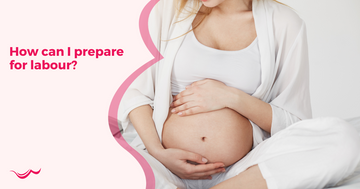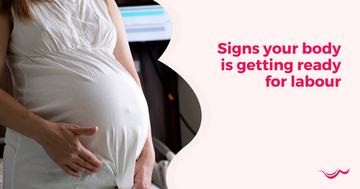Hospital Bag Checklist: What to Pack for Mum and Bub
by Nikki Warren on May 21, 2024

Whether you're a last-minute mum or always plan ahead, you can't avoid packing your hospital bag... Or rather, bags! We understand that pregnancy and birth come with a lot of information, so we've made this one simple for you.
Here is your simple guide on what's a good idea to pack in your hospital bags.
Mum’s Bag:
Giving birth is an exciting, but also nerve-wracking experience. Having your bag ready to go with familiar brands and items in your hospital bag, will help make you feel more comfortable and at ease.
Atmosphere and Environment:
- A copy of your birth plan (keep reading for some more information on this)
- Massage oil with essential oils in it
- TENS machine
- Portable speaker for music (have your Spotify playlist ready)
- Headphones
- Affirmation Cards or Affirmation App on your phone
Clothing
- Nursing Bras
- Swimmers if you plan on having a water birth
- Loose, comfortable clothing: shirts, oversized t-shirts, loose pants and tracksuit pants in dark colours are ideal
- Scrunchies and hair ties
- Large, comfortable underwear
- Nursing clothes: singlets, comfortable PJs, nursing tops and t-shirts
- Loose jumper to keep you warm
- Dressing gown
- Fluffy socks and slippers
- Extra PJs
Other:
- Breastfeeding vitamins
- Iron supplements to help replace the iron lost from all that blood loss!
- Herbs to assist recovery after birth
- Snacks like nuts, dried fruit, and muesli bars are great!
- Drink bottle with a straw
- Lip balm
- Heat packs (although some hospitals provide these)
- Maternity pads and breast pads
- Toiletries (toothbrush, toothpaste, shampoo, facial cleanser, shower gel, hairbrush – the usual!)
- Phone chargers and speaker chargers
- Your medicare card and identification (eg. driver's license)
- Any hospital paperwork and health insurance documents
Birth Partner's Bag:
The birth process is almost as nerve-wracking for the birth partner as it is for Mum! You need to be feeling as comfortable as possible so you can support your partner through what is going to come next. We recommend you don't forget to bring:
- Board shorts or swimmers (if a water birth is on the cards)
- Chargers
- A change of clothes
- Headphones
- Snacks
Baby Bag:
Of course, you can't forget to pack a bag for the little one who will be coming home with you! If you're first time parents, this may be overwhelming, so here's what we recomend taking to the hospital or birthing centre for your bub:
- Newborn onesies (bring more than you think you will need)
- Singlets
- Newborn nappies and baby wipes
- Socks and beanies
- Swaddles and blankets
- Baby massage oil
- Going home outfit and car seat if you planning on going home as soon as you can after the birth!
Birth Plan:
If you’ve never heard of this before, a birth plan is like a note to your healthcare and labour and delivery support team. It helps you plan your perfect birth and share your labour and delivery preferences with your support team. Birth plans are helpful guides, but it's important to stay flexible as your labour and delivery progress. What’s most important is you and your baby’s safety.
Everyone is different, but typically a birth plan will cover the following:
Preferences for your environment during labour like lighting and music (if any).
During childbirth, you have options for how to sit or lie down. These options can include squatting, using a fit ball or bean bag, or lying on your side.
Your choices for pain relief, such as saline water injections for back pain if needed, if and when you want to use an epidural, nitrous oxide, and other options.
Preferences on monitoring and interventions, such as foetal monitoring, dilation monitoring, medical interventions, and cord clamping preferences.
Post-birth care choices: skin-to-skin with baby, partner also having skin-to-skin contact, room visitors, and breastfeeding.
Whether you would like the vitamin K injection or oral drops or none at all for bubs after birth.
Whether or not you consent to the Hepatitis B vaccine after bubs is born.
As always, it’s important to communicate this with your birth partner and healthcare support team.
We hope this has made you feel a little more at ease and a little more prepared for your journey into motherhood!




